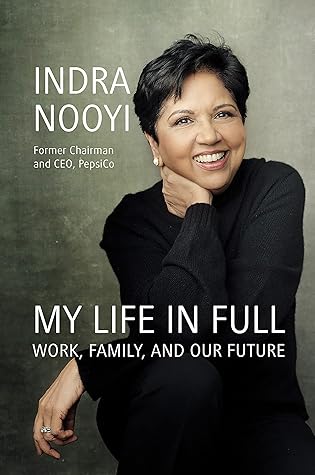More on this book
Community
Kindle Notes & Highlights
by
Indra Nooyi
Read between
December 30, 2021 - January 17, 2022
I am still the girl who grew up in a close family in Madras, in the South of India,
I am also the woman who arrived in the US at age twenty-three to study and work and,
I was female, an immigrant, and a person of color entering an executive floor where I was different from everyone else.
In fourteen years as a consultant and corporate strategist, I had never had a woman boss. I had no female mentors. I wasn’t upset when I was excluded from the customs of male power; I was just happy to be included at all.
My childhood was not a world of “Great job!” It was more like “That was so-so” or “Is this the best you can do?” We were accustomed to honesty, not false encouragement.
The British East India Company landed on this shore in 1639, and, more than three hundred years later, we lived in a mix of ancient Indian temples and nineteenth-century colonial offices, courthouses, schools, and churches.
Madras, which was renamed Chennai in 1996, is the capital of the southern Indian state of Tamil Nadu, with an economy anchored by textiles, automakers, and food processing, and—more recently—software services.
We did all the complex modeling with calculators and No. 2 pencils and filled in hundreds of cells on paper spreadsheets. We plotted graphs by hand and then turned them into a production department with precise instructions as to how to make the slide decks presentable.
We built a cost model of every tissue manufacturing line in the country—the speed, the waste, the raw materials used, the cost.
Carl, a friendly, wise manager who had recently moved from London, knew the toll of consulting work and went out of his way to create a nurturing environment for those of us who worked for him.
This episode in my life underscores how paid leave to get through all kinds of personal situations—including childbirth and personal illness but also other circumstances—can be a game changer for so many careers.
Our biggest competitor was GE, led by the legendary CEO Jack Welch, who governed a sprawling corporate headquarters just twenty miles from our offices in Stamford. ABB studied every GE move with envy and fear.
Gerhard was always backstopping me. He soon arranged for me to have lunch with Jack Welch.
White American men held fifteen of the top fifteen jobs at PepsiCo when I walked in.
Good business demands tough decisions based on rigorous analysis and unwavering follow-through. Emotion can’t really play a part. The challenge we all face as leaders is to let the feelings churn inside you but then to present a calm exterior, and I learned to do that.
we spun off the restaurant business into a publicly traded company called Tricon Global Restaurants. The company later changed its name to YUM! Brands and still owns and operates the thriving Pizza Hut, Taco Bell, and KFC chains.
Roger pulled me aside one morning and remarked that Coca-Cola’s price-to-earnings ratio was around forty-five and PepsiCo was hovering around twenty.
I had just settled into the CFO job, in September 2000, when Roger got a call from Bob Morrison, the CEO of Quaker Oats, asking if PepsiCo might consider buying his company.
Quaker’s sale was not an open auction. PepsiCo was quietly asked to hear the pitch. Roger, Steve, and I and a few of our operating executives flew to Chicago for a full day of presentations.
Within hours, the news leaked that PepsiCo and Quaker were in talks, and then the pressure was really on.
“Listen to me,” my mother replied. “You may be the president or whatever of PepsiCo, but when you come home, you are a wife and a mother and a daughter. Nobody can take your place. “So you leave that crown in the garage.”
I think that leaders need to understand the details behind what they are approving before they affix their signature to anything. This is not about trusting the people that work for you. It’s about basic responsibility. Don’t be a “pass-through.”


